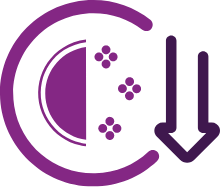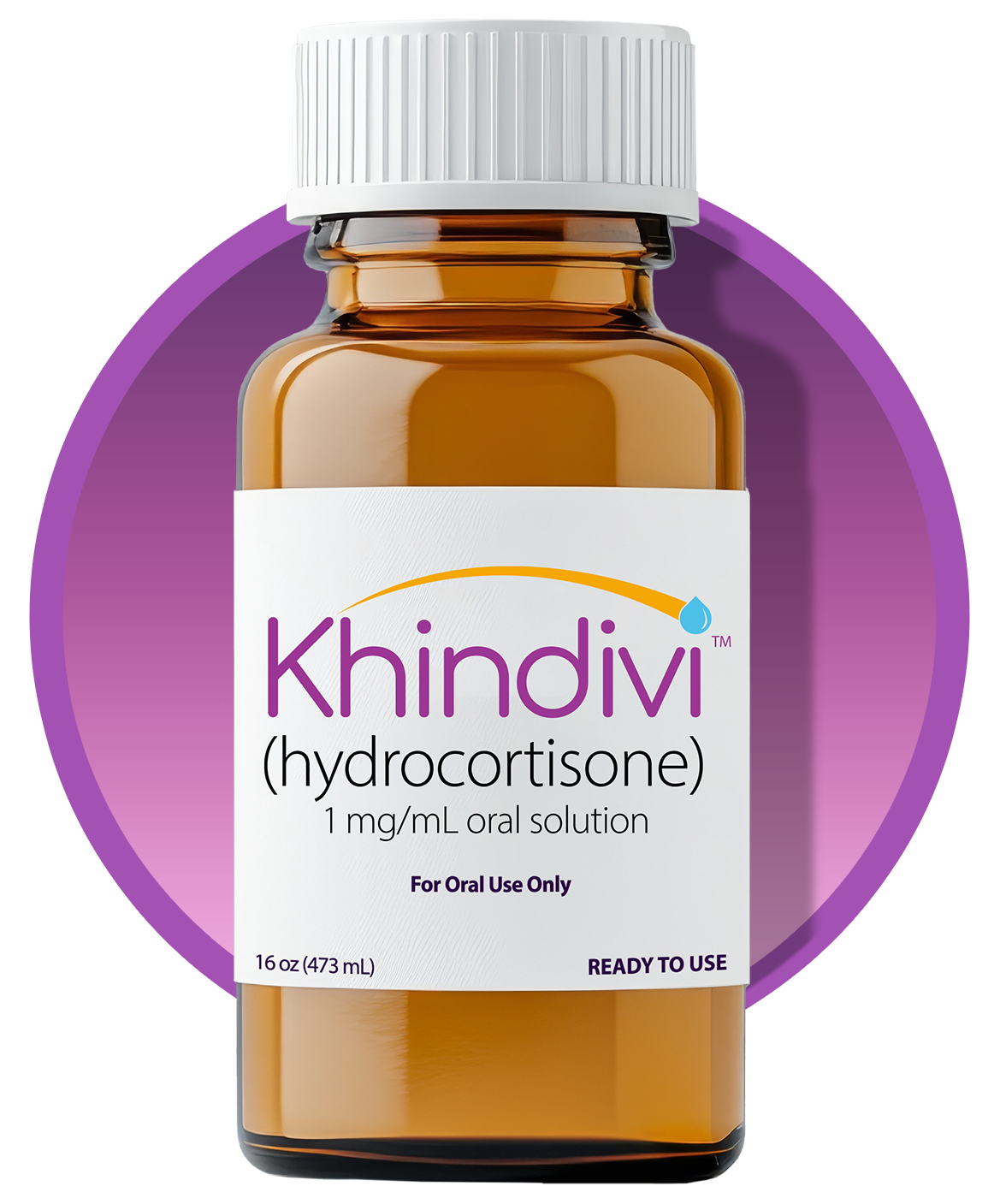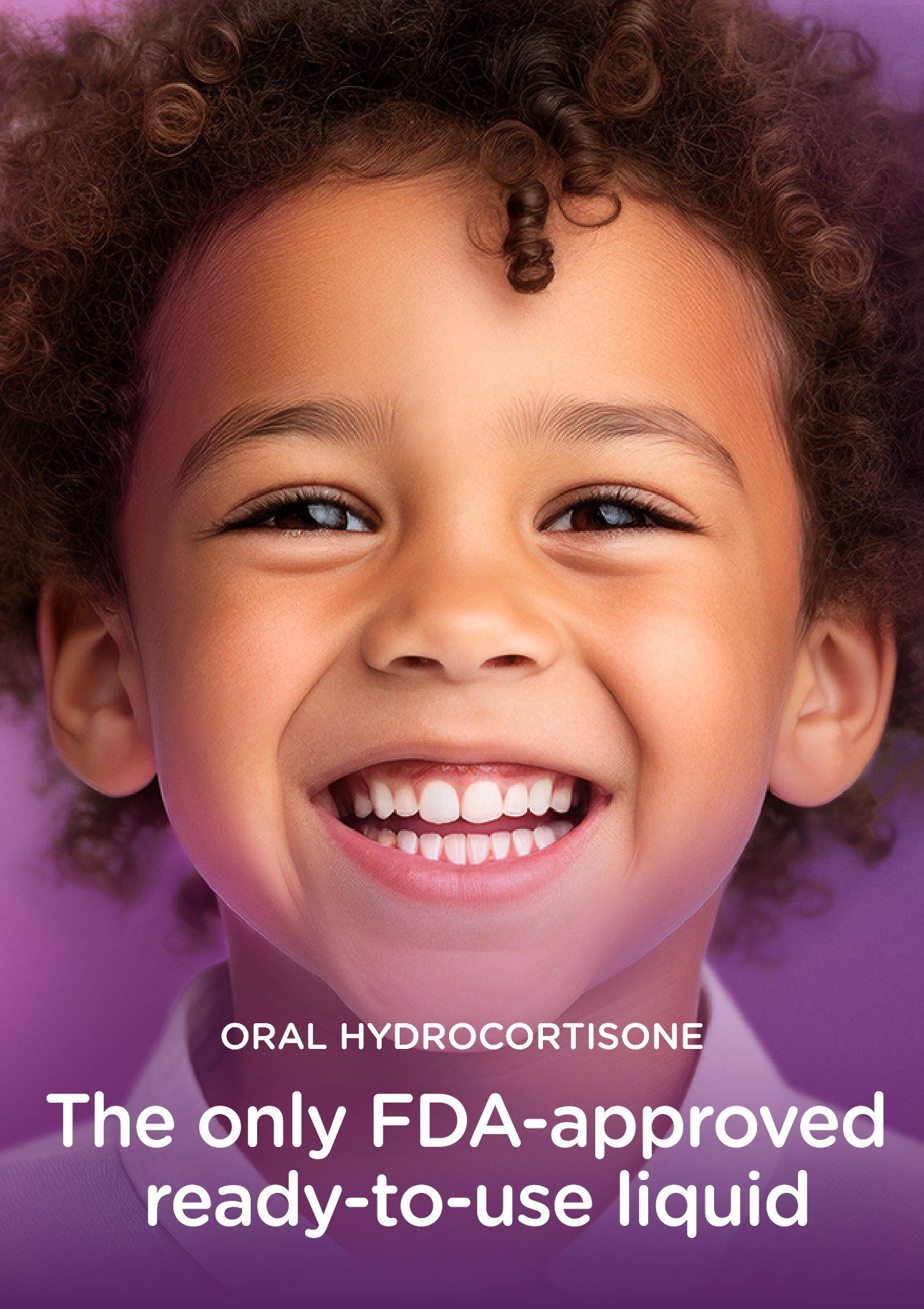For children aged 5 years and older with adrenal insufficiency
Why accurate dosing matters
Delivering the right amount of hydrocortisone is essential to keeping children with adrenal insufficiency healthy.2,3
That’s why it’s important to give the precise dose prescribed by your child’s doctor.
There are potential long-term health problems to both overdosing and underdosing:

Overdosing can lead to3-5*:
- Abnormal weight gain
- Growth issues
- High blood pressure
- Cardiovascular disease

Underdosing can lead to3-5*:
- Adrenal crisis
- Low blood pressure
- Weight loss
- Generally feeling unwell
*No representation is made regarding the effect of KHINDIVI on these conditions.
The truth about tablets
Getting the right dose of hydrocortisone can be tricky when it’s prescribed in a tablet. You may have to cut or crush them to get the exact amount your child needs.2 And because most young children can’t swallow pills yet, it’s challenging to make sure they get their exact prescribed dose every time.
When pharmacies mix hydrocortisone specially for your child (called compounding), the strength can vary from batch to batch. This means your child’s treatment might not be consistent from day to day.6,7
KHINDIVI is designed to help you get the prescribed dose right every time†

Depiction only. Not actual label.
KHINDIVI is designed to help you get the prescribed dose right every time†
-
 Ready-to-use liquid designed for accurate dosing†
Ready-to-use liquid designed for accurate dosing†
-
 No cutting, splitting, or crushing tablets—simply a liquid
No cutting, splitting, or crushing tablets—simply a liquid
-
 No need for refrigeration, mixing, or shaking
No need for refrigeration, mixing, or shaking
†When entire dose is given as directed.
Learn how to get started with KHINDIVI
USE
KHINDIVI is a prescription medicine used in children 5 years of age and older as replacement therapy when the adrenal gland is not making enough cortisol.
Limitation of Use: KHINDIVI is not approved for increased dosing during periods of stress or acute events. Use a different hydrocortisone-containing drug product for stress dosing.
IMPORTANT SAFETY INFORMATION
Always give KHINDIVI exactly as your doctor has directed.
Do not take KHINDIVI if you are allergic to hydrocortisone or any of its other ingredients.
Adrenal Crisis: Giving too low a dose or stopping medication can cause low levels of cortisol, which can result in serious illness or death. Treatment with intravenous hydrocortisone should be started immediately. When switching from another type of hydrocortisone to KHINDIVI, watch your child closely for any changes. During periods of stress such as infections or after surgery, your doctor should switch to another oral hydrocortisone product and increase the dose.
Systemic Adverse Reactions Due to Inactive Ingredients
Hyperosmolarity: KHINDIVI is not approved in children less than 5 years of age. The inactive ingredients in KHINDIVI can cause dangerous fluid imbalances.
Metabolic Acidosis and Other Adverse Reactions: Some ingredients in KHINDIVI may cause a build-up of acid in the body, low blood sugar, or injuries to the liver, kidneys, or brain, that may increase the risk of adrenal crisis.
Laxative Effects Due to Inactive Ingredients: Some ingredients in KHINDIVI may cause stomach upset resulting in vomiting and/or diarrhea and could increase the risk of adrenal crises in patients.
Immunosuppression and Increased Risk of Infection With Use of a Dosage Greater Than Replacement: Use of a greater than replacement dosage can suppress the immune system and increase the risks of new infections. Contact your health care provider if any infections develop.
Growth Retardation: The long-term use of corticosteroids in high doses may cause growth retardation in children.
Decrease in Bone Density: Corticosteroids can affect your child’s bone growth and strength.
Cushing’s Syndrome Due to High Doses of Corticosteroids: Treatment with high doses of corticosteroids can cause Cushing’s Syndrome. Treatment should be limited to the smallest dose required, and your child’s growth and development monitored appropriately.
Psychiatric Changes: Corticosteroids can change your child’s behavior or mood. Tell your doctor if your child has periods of extreme happiness, extreme sadness, hallucinations, or depression.
Changes in Vision: Tell your doctor if your child has blurred vision or other vision problems during treatment with KHINDIVI.
Gastrointestinal Adverse Reactions: Tell the doctor if your child has stomach pain, upset stomach, black, tarry stools, or vomiting of blood. These could be signs of ulcers or tears in the stomach or intestines. Taking anti-inflammatory nonsteroidal drugs, like ibuprofen, naproxen, or aspirin, can increase the risk of ulcers or tears.
The most common side effects of KHINDIVI include retaining fluids, changes in glucose tolerance, high blood pressure, behavioral and mood changes, greater appetite, and weight gain.
Vaccination: Administration of live vaccines may be acceptable in KHINDIVI-treated pediatric patients with adrenocortical insufficiency who receive replacement corticosteroids.
Please visit KHINDIVI.com/patient for more information.
You are encouraged to report negative side effects of prescription drugs by contacting Eton Pharmaceuticals, Inc. at 1-855-224-0233 or the U.S. Food and Drug Administration (FDA) at www.fda.gov/safety/medwatch or call 1-800-FDA-1088.
Please see full Prescribing Information for more information.
USE
KHINDIVI is a prescription medicine used in children 5 years of age and older as replacement therapy when the adrenal gland is not making enough cortisol.
Limitation of Use: KHINDIVI is not approved for increased dosing during periods of stress or acute events. Use a different hydrocortisone-containing drug product for stress dosing.
IMPORTANT SAFETY INFORMATION
Always give KHINDIVI exactly as your doctor has directed.
Do not take KHINDIVI if you are allergic to hydrocortisone or any of its other ingredients.
Adrenal Crisis: Giving too low a dose or stopping medication can cause low levels of cortisol, which can result in serious illness or death. Treatment with intravenous hydrocortisone should be started immediately. When switching from another type of hydrocortisone to KHINDIVI, watch your child closely for any changes. During periods of stress such as infections or after surgery, your doctor should switch to another oral hydrocortisone product and increase the dose.
Systemic Adverse Reactions Due to Inactive Ingredients
Hyperosmolarity: KHINDIVI is not approved in children less than 5 years of age. The inactive ingredients in KHINDIVI can cause dangerous fluid imbalances.
Metabolic Acidosis and Other Adverse Reactions: Some ingredients in KHINDIVI may cause a build-up of acid in the body, low blood sugar, or injuries to the liver, kidneys, or brain, that may increase the risk of adrenal crisis.
Laxative Effects Due to Inactive Ingredients: Some ingredients in KHINDIVI may cause stomach upset resulting in vomiting and/or diarrhea and could increase the risk of adrenal crises in patients.
Immunosuppression and Increased Risk of Infection With Use of a Dosage Greater Than Replacement: Use of a greater than replacement dosage can suppress the immune system and increase the risks of new infections. Contact your health care provider if any infections develop.
Growth Retardation: The long-term use of corticosteroids in high doses may cause growth retardation in children.
Decrease in Bone Density: Corticosteroids can affect your child’s bone growth and strength.
Cushing’s Syndrome Due to High Doses of Corticosteroids: Treatment with high doses of corticosteroids can cause Cushing’s Syndrome. Treatment should be limited to the smallest dose required, and your child’s growth and development monitored appropriately.
Psychiatric Changes: Corticosteroids can change your child’s behavior or mood. Tell your doctor if your child has periods of extreme happiness, extreme sadness, hallucinations, or depression.
Changes in Vision: Tell your doctor if your child has blurred vision or other vision problems during treatment with KHINDIVI.
Gastrointestinal Adverse Reactions: Tell the doctor if your child has stomach pain, upset stomach, black, tarry stools, or vomiting of blood. These could be signs of ulcers or tears in the stomach or intestines. Taking anti-inflammatory nonsteroidal drugs, like ibuprofen, naproxen, or aspirin, can increase the risk of ulcers or tears.
The most common side effects of KHINDIVI include retaining fluids, changes in glucose tolerance, high blood pressure, behavioral and mood changes, greater appetite, and weight gain.
Vaccination: Administration of live vaccines may be acceptable in KHINDIVI-treated pediatric patients with adrenocortical insufficiency who receive replacement corticosteroids.
Please visit KHINDIVI.com/patient for more information.
You are encouraged to report negative side effects of prescription drugs by contacting Eton Pharmaceuticals, Inc. at 1-855-224-0233 or the U.S. Food and Drug Administration (FDA) at www.fda.gov/safety/medwatch or call 1-800-FDA-1088.
Please see full Prescribing Information for more information.
References: 1. KHINDIVI. Package insert. Eton Pharmaceuticals, Inc; 2025. 2. Neumann U, Whitaker MJ, Wiegand S, et al. Absorption and tolerability of taste-masked hydrocortisone granules in neonates, infants and children under 6 years of age with adrenal insufficiency. Clin Endocrinol (Oxf). 2018;88(1):21-29. doi:10.1111/cen.13447 3. Bornstein SR, Allolio B, Arlt W, et al. Diagnosis and treatment of primary adrenal insufficiency: an Endocrine Society clinical practice guideline. J Clin Endocrinol Metab. 2016;101(2):364-389. doi:10.1210/jc.2015-1710 4. Han TS, Conway GS, Willis DS, et al. Relationship between final height and health outcomes in adults with congenital adrenal hyperplasia: United Kingdom congenital adrenal hyperplasia adult study executive (CaHASE). J Clin Endocrinol Metab. 2014;99:E1547-E1555. doi:10.1210/jc.2014-1486 5. Oprea A, Bonnet NCG, Pollé O, Lysy PA. Novel insights into glucocorticoid replacement therapy for pediatric and adult adrenal insufficiency. Ther Adv Endocrinol Metab. 2019;10:2042018818821294. doi:10.1177/2042018818821294 6. Neumann U, Burau D, Spielmann S, et al. Quality of compounded hydrocortisone capsules used in the treatment of children. Eur J Endocrinol. 2017;177(2):239-242. doi:10.1530/EJE-17-0248 7. FDA’s Human Drug Compounding Progress Report: Three Years After Enactment of the Drug Quality and Security Act. Published January 2017. Accessed September 8, 2025. https://www.fda.gov/drugs/human-drug-compounding/fdas-human-drug-compounding-progress-report-three-years-after-enactment-drug-quality-and-security

